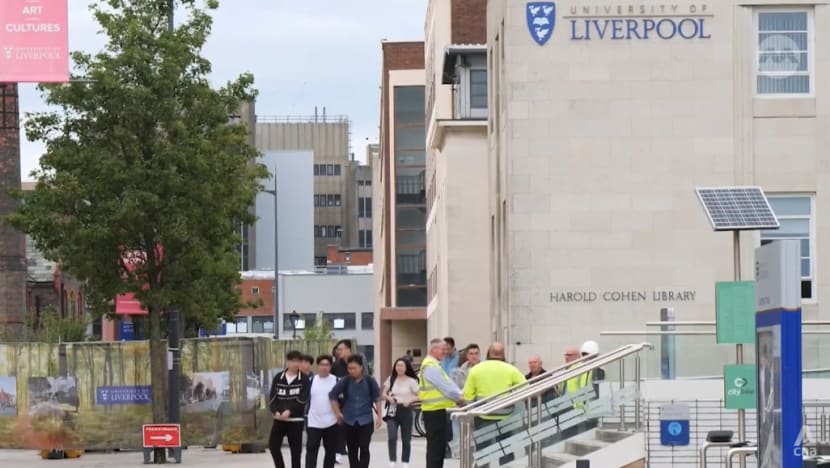Britain to stop overseas students from bringing family amid efforts to curb migration
Britain said that while it wants more international students, the number of dependents that they have been bringing has reached unsustainable levels.

Students at the University of Liverpool.
LONDON: The British government plans to stop most international students from bringing family members with them to the United Kingdom.
Currently, those on a postgraduate course can be joined by a partner and their children.
However, that is set to change from next year as Britain seeks to lower its net migration.
Students from China and India, who make up nearly a quarter of the country’s student population, will be among those most affected.
The new laws do not apply to those on research postgraduate programmes.
FAMILY’S SUPPORT
One international student who brought his family along for his postgraduate course is Mr Sourabh Mangal, who is studying project management at the University of Liverpool.
A key priority when considering the country and university to study in was whether his wife and son could join him, he said.
“If you are doing a crash course for six months, or for a year, I can understand if your family's not with you. But if you are doing a master's degree or a PhD (doctorate), having your family with you is important because it gives you emotional and moral support,” said Mr Sourabh.
He added that had he not been allowed to bring his family along, he would not have considered Britain, and might have looked elsewhere such as Canada instead.

TOO MANY DEPENDENTS
The Home Office said that while it wants more international students to study in Britain, the number of dependents that they have been bringing with them has reached unsustainable levels.
Last year, almost 136,000 visas were granted to dependents of students – more than an eight-fold increase from 16,000 dependents in 2019.
Both the student visa and dependent visa allow the holder to work in Britain. The government said the visas are being abused as a backdoor route to find employment.
There is also a concern that dependents are competing with locals for housing and jobs.
MIXED REACTION
The reaction from Britain’s universities has been mixed.
Some are worried that the changes risk affecting the US$33 billion per year international students bring to the economy.
Others worry that reducing the number of dependents will exacerbate an already painful labour shortage, as they currently make up for a shortfall in domestic workers.
The University of Portsmouth, which welcomes new cohorts of international students each year from countries like Bangladesh, Malaysia, and China, said it recognises their contributions.
“(International students and their dependents) enrich the culture, they enrich the campus, they enrich the city. The individual students themselves are also enriched so that they are equipped to deal with working in a global context,” said Mr Chris Chang, the university’s deputy vice chancellor of global engagement and student life.
However, he said he understands the government’s balancing act, and believes the appeal of British universities will keep demand for international placements high.

“There will be some students put off, but genuine students who want to improve themselves and get a qualification in order to move up the career ladder will not,” said Mr Chang.
He said the new rules will help decrease pressure on public services and housing in Portsmouth, where students make up 10 per cent of the city’s population.
The government hopes admitting fewer dependents from overseas will help lower net migration figures – a key Conservative Party promise during the 2019 election.
Ahead of the next election in 2024, the government also wants to show that it keeps its word and is committed to making progress, observers said.
The changes are due to be implemented for the cohort starting classes next January.
University leaders warned this could mean a spike of applications in September from students wishing to study with dependents in Britain, before the new rules kick in.












